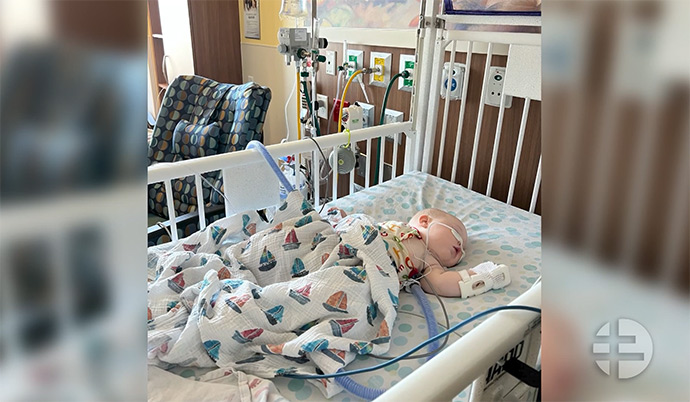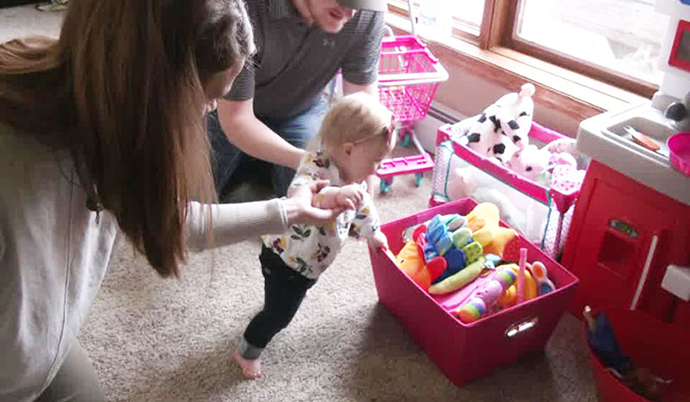Protect Your Family from RSV
For many people, RSV feels like a common cold. It takes a couple of weeks to get better, and most people fully recover. But for more vulnerable groups, like babies and older adults, RSV can cause severe infection and life-threatening illness.
Get prepared for RSV by understanding the symptoms and doing what you can to stop the spread. RSV immunization methods help protect higher risk groups from experiencing the most extreme symptoms.
How Serious is RSV?
RSV is a common respiratory virus that causes infections of the lungs and respiratory tract. Often, people have been infected by age 2.
RSV Symptoms for Healthy Adults and Children
For most adults and older children who are healthy, RSV symptoms are similar to the common cold, appear four to six days after exposure and go away within a couple of weeks. They may include:
- Congested or runny nose
- Dry cough
- Low-grade fever
- Sore throat
- Sneezing
- Headache
RSV Symptoms for Higher Risk Groups
Those with weakened immune systems, like older adults, babies, people who are immunocompromised, or those with heart or lung disease, may experience more severe cases of RSV. For this group, RSV can cause life-threatening infection and require a hospital stay.
Severe RSV Symptoms (Older Kids and Adults)
In severe cases, RSV can spread through the respiratory tract, causing symptoms like:
- Fever
- Severe cough
- Wheezing
- Rapid or difficulty breathing
- Blueish or grayish skin
Severe RSV Symptoms (Infants)
In infants, signs of severe RSV include:
- Short, shallow and rapid breathing
- Struggling to breathe
- Cough
- Poor feeding
- Unusual tiredness
- Irritability
Where Can I Get an RSV Vaccine or Immunization?
Sanford Health offers a variety of ways to receive the vaccinations you need to stay healthy. You can schedule a vaccine visit on My Sanford Chart or by calling a Sanford Health location near you.
Schedule a Vaccine Appointment
If you don’t have My Sanford Chart, you can make an appointment online.
How Can You Prevent RSV?
RSV spreads in a few ways:
- Virus droplets land in your eyes, nose or mouth when an infected person coughs or sneezes.
- You come in direct contact with the virus, like kissing the face of a child.
- You touch a surface with the virus on it, like a doorknob, and then touch your face.
People with RSV are usually contagious for three to eight days, often before they show signs of illness. The virus can survive on hard surfaces for many hours.
Help Stop the Spread of RSV
Everyone can help stop the spread of RSV by practicing good hygiene:
- Cover your mouth when you cough or sneeze.
- Wash your hands frequently.
- Stay home when you feel sick.
Additionally, RSV immunization helps prevent severe cases in vulnerable groups. It won’t completely stop RSV from spreading, but it can help keep people out of the hospital. Make it a part of your RSV prevention plan.
Frequently Asked Questions About RSV
Who should get immunized?
Older adults: The CDC recommends the RSV vaccine for everyone ages 75 and older and for those ages 50 to 74 who are at increased risk of severe RSV. This includes those who have chronic heart or lung disease and who live in a long-term care facility.
Older adults who have already gotten the RSV vaccine do not need a second dose this year. The best time to get vaccinated is in late summer and early fall.
Infants and children: The CDC recommends maternal RSV vaccination or infant immunization with RSV monoclonal antibodies. Most infants do not need both.
One dose of a monoclonal antibody called nirsevimab (Beyfortus) is recommended for infants younger than 8 months who are born during or entering their first RSV season. One dose of nirsevimab is also recommended for children between 8 and 19 months who are at higher risk for severe RSV and entering their second RSV season.
Pregnant women: A single dose of Abrysvo is recommended between 32 and 36 weeks of pregnancy, September through January, to protect infants from severe RSV.
How does RSV immunization protect infants and young children?
Maternal RSV vaccination or infant immunization with monoclonal antibodies can prevent severe RSV in infants.
Monoclonal antibodies are not vaccines and do not activate the immune system. Instead, the antibodies themselves protect the body from severe RSV and are very effective in preventing hospitalization.
How does the RSV vaccine protect adults?
The vaccine works by causing an immune response that can protect you from a respiratory disease if you get RSV in the future. Eligible adults can get a single dose of any of the three available vaccines.
How do you treat RSV?
There is no specific treatment for RSV, but you can treat symptoms with over-the-counter medications.
If your symptoms worsen, you have trouble breathing or are not drinking enough fluids, you should seek care from a provider.
Do I have to pay for my RSV vaccine or immunization?
Vaccinations are typically covered by health insurance plans.
Options are available for those who don’t have health insurance. Search for assistance at sanfordhelps.com.
Patient Stories

Nurse Thankful for New RSV Treatments After Son’s Scare
Siri Thaden, a Sanford Health nursing manager, is all too familiar with what it’s like to have a little one contract RSV.
Knowing how scary it was to see her own son hospitalized, Thaden is grateful for the advances made in infant RSV immunization.

Small Town Care Was Ready When Baby Needed It
As both a provider and patient in Worthington, Minnesota, Kristen Gruis understands the importance of quality rural health care and knows the care she and her colleagues provide is top-notch. However, she hadn’t necessarily experienced it as a patient.
That changed when daughter, Reagan, got sick as an infant.